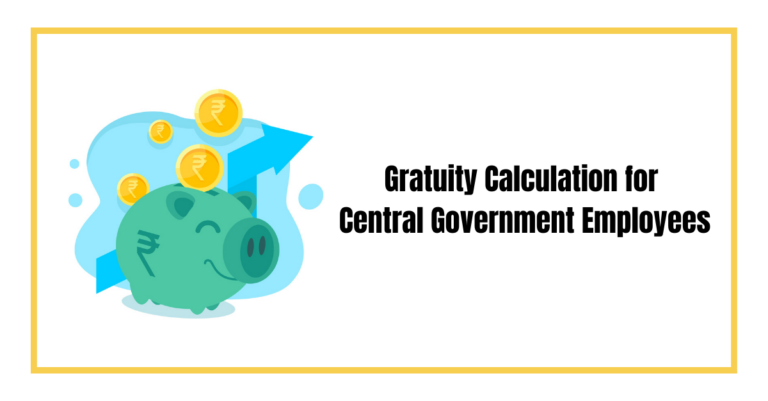This article helps you to understand the meaning of retirement, how much an individual should save for his retirement, how to use a retirement calculator, the impact of inflation on an individual’s retirement savings, and finally, common sources of retirement funds.
Introduction – Withdraw Gratuity After Retirement
Retirement can be defined as withdrawing oneself from his active working life or in other words, his present job, and spending the rest of his life at home with family and friends. However, there are several factors that play a crucial role in an individual’s decision to retire from his active working life. The first and foremost thing is the individual’s physical and/or mental health because if an individual is not physically and/or mentally fit to continue with his job, then he should consider retiring permanently from his active working life. Also, there are many people who remain dissatisfied with their job roles or responsibilities because they cannot bear the mounting workload and stress level in their workplace and might consider retiring early. In addition, another factor that affects an individual’s retirement decision is whether he is financially strong enough to retire. Last but not the least, age is also a crucial factor that influences an individual’s decision to retire. Though people may retire early due to some reason or the other, the normal age for retirement is 55 to 70 years. Lets see How Much Can You Withdraw Gratuity After Retirement.
However, when we are talking about retirement, it should be noted that in case an individual is physically and mentally fit to continue with his job, he usually does so till he attains the retirement age.
Are You Entitled to Get Gratuity Post-retirement?
A pertinent question, asked by many ones needs to understand that, all the employees who have worked for a period of 5 years in any organization are eligible to get gratuity. A retirement gratuity calculator can be used by retirees to calculate the amount of gratuity that he or she is entitled to. At the end of the day, the gratuity amount can add up to your savings post-retirement.
How Much to Save for Retirement?
After defining retirement, the next question that immediately comes to our mind is how much money we should save for our retirement. The answer to this question will vary across individuals, depending upon the amount of money that the individual needs to run his family, his health as well as life expectancy, the amount of money inherited by the individual, etc. However, there are few rules pertaining to how much an individual should save for retirement.
- The Rule of 10%: According to this rule, an individual should save 10%-15% of his pre-tax income per annum during his working years.
- The Rule of 80%: According to this rule, an income amounting to 70%-80% of an individual’s pre-retirement income can help him to maintain his standard of living post-retirement.
- The Rule of 4%: Individuals having a good projection of the amount of money to be required per annum post-retirement can divide the figure by 4% to find out the amount they need to maintain their lifestyle.
How to Use Retirement Calculator?
A retirement calculator can help individuals to plan the financial part of their retirement. Each of the calculations can be used individually for the sake of fast and simple calculations. It helps you to find out the amount of money you need to retire, how you can make savings for retirement, the amount of money you can withdraw every month after retirement, and the amount of money you can withdraw every month from your savings to make the savings last for a given time span, etc.
For doing the above calculations, an individual needs to enter the required inputs. For instance, for calculating the amount of money you need to retire you should enter your present age, your income at present, income required post-retirement, your planned age of retirement, your life expectancy, expected income from social security programs, other income post-retirement, average return on investment and an annual rate of inflation.
Impact of Inflation on Retirement Savings
Before we move on to the impact of inflation on retirement savings, let us first understand the meaning of inflation. Inflation can be defined as the general rise in price level and a gradual decline in the purchasing power of money. The rising cost of basic amenities due to inflation post-retirement can become a nightmare for many individuals as it leads to unexpected depletion in their retirement savings. Though it is a known fact that inflation has an adverse impact on an individual’s retirement savings, it is, however, beyond the control of an individual. Hence, to be precise, inflation not only reduces an individual’s purchasing power of money but also increases his future monetary requirements.
Given this highly unpredictable nature of inflation, individuals do not usually make their retirement plans or investments taking into consideration the inflationary pressures which may arise in the future but emphasize earning as much total return on investment as possible to sustain themselves during these unpredictable times.
Common Sources of Retirement Funds
Some of the common sources of retirement funds include social security, IRA as well as Roth IRA, pension programs, Certificates of Deposit (CDs) and investments, individual savings, employer matching programs, etc.
- Income from Social Security: Social Security is a kind of social insurance program which is conducted by the government to safeguard individuals against old age, poverty, and disability.
- Income from IRA as well as Roth IRA: In the United States, the traditional Individual Retirement Account (IRA), as well as Roth IRA, are popular kinds of retirement savings. There are specific tax shields that make both IRA and Roth IRA attractive. The primary difference between traditional IRAs and Roth IRAs is that the former’s contributions are usually deducted from gross pay but are taxed at the time of withdrawal. On the other hand, contributions to Roth IRA are deposited by making use of after-tax dollars and are not taxed at the time of withdrawal during retirement.
- Income from Pension Programs: Pension plans are regarded as funds for retirement that are pooled together and managed by the employers for their employees till they retire. In the United States, the majority of the public servants are covered by pension programs instead of Social Security. Some private employers also give pension benefits to their employees.
- Income from Certificates of Deposit (CDs) and Investments: There are some funds that provide a comparatively steady growth rate over time. For instance, CDs, as well as fixed-income investments, have relatively low returns, but they are suitable options for those who are looking for a low-risk, steady flow of income, and are approaching their retirement or have already retired.
- Income from Individual savings: The easiest way to make savings for your retirement is via personal savings because the surplus disposable income of the majority of the individuals gets accrued here before anything is done with that money.
- Income from Employer Matching Programs: The two popular ways to make savings for retirement in the United States are Employer Matching Programs like 401(k) and their branches, the 403(b).
- Income from Inheritance: An inheritance is a share of the assets that is given to the heir/s of the person who has died. This can be used by the heir as income for retirement.
- Passive Income: Passive income includes income from any business, income from rent, dividends on stocks, royalties, etc.
How Much Can You Withdraw Gratuity After Retirement?
After retirement, an employee can withdraw their gratuity amount in full, subject to a maximum limit of Rs. 20 lakhs. However, if the gratuity amount exceeds Rs. 20 lakhs, the employer may choose to pay the excess amount through an insurance policy with the Life Insurance Corporation of India (LIC). It is important to note that the gratuity amount received by the employee is tax-free up to a certain limit, as per the Income Tax Act. Overall, gratuity serves as a valuable retirement benefit for employees and can provide financial security during their post-employment years.
Conclusion – Withdraw Gratuity After Retirement
So, we hope that now you have got an idea about how much gratuity you are eligible to withdraw after retirement in India.
Also, Read:










